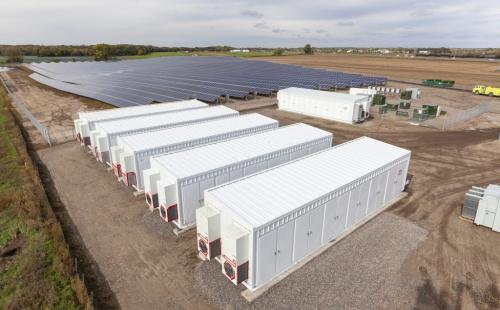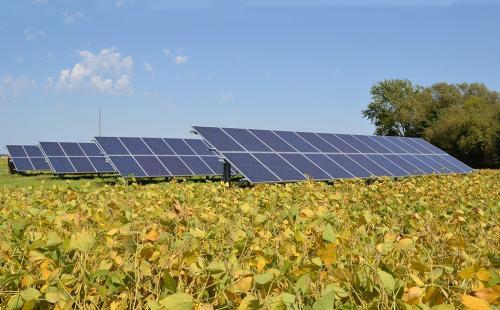Updated 2/22/2021
The 2021 Minnesota Legislative Session is in full swing! We've been busy meeting with legislators and testifying virtually and are optimistic for the exciting changes this session could bring. Here's a look at what we've been up to so far:
Brightfields
MnSEIA is working to amend the Landfill Cleanup Act (LCA) to be more encompassing and forward thinking. The LCA only focuses on cleaning up and covering landfills, yet lacks any foresight. MnSEIA’s goal is to add to the LCA, allocating Renewable Development Account funds for the redevelopment of closed landfills so they can benefit the state and surrounding communities. Learn more about our work with brightfields here.
Avoided Cost Statutory Change
The current Small Power Production Statute has language in it around Avoided Cost pricing for Renewable Resources. The way it is written forces utilities to pay a price commensurate with the least cost renewable energy resource they have ever received a bid for. Moreover, the language that was once meant to encourage renewable development is now standing in its way. In a recent PUC docket there were 12 different ways put forward to calculate the 5MW wind/solar hybrid’s Avoided Cost. This regulatory confusion can be easily overcome by removing language from Minn. Stat. 216B.164 and ensuring that all qualifying facilities in Minnesota are subject to the same pricing mechanisms.
Community Solar Gardens Community Access Project
In an effort to redirect Community Solar Garden (CSG) development toward residential subscribers—as many had anticipated in the original 2013 legislation—a few stakeholders and members have worked with MnSEIA to advance a designation for CSGs that meet certain requirements. This type of project would need to meet certain transparency, low-income, and percentage of residential subscriptions criteria in order to gain access to more advantageous rates and on-bill repayment.
Community Solar Gardens Contiguous County Rule Change
A number of benefits will flow from removing the requirement that subscribers to a given CSG reside in the same or contiguous county. First, subscribers will have many more options, so that certain counties are not placed at an arbitrary geographic disadvantage. Second, developers will also have more viable sites available, which will ease pressure on substation space and on host communities. Third, Greater Minnesota will benefit with economic development from gardens built outside the Metro area, and from bringing savings to subscribers across Xcel territory. Representative Acomb has introduced Bill HF653, which changes the contiguous county rule so that community solar gardens are not unfairly disadvantaged.
Distributed Generation Benefits Accrue to the Utilities
Utilities are not incentivized enough to support the expansion of distributed generation, leading to situations where customers are forced to pay high interconnection fees. MnSEIA is working to create incentives for utilities and customers and push for favorable policies to promote the growth of solar in Minnesota. Distributed generation enhances a utility’s ability to ensure peak demand is met reliably and efficiently. Customers reduce their overall demand by being supplied with on-site generation and will only draw from the grid what their system doesn’t cover.
PV & Storage Demand Credit for Ottertail and Minnesota Power Customers
Energy Storage is an excellent way of capturing even more benefits from your solar array. Additionally, storage, when combined with solar, has the ability to drastically reduce peak demand loads for large power consumers such as commercial and industrial customers. However, customers located outside of Xcel’s service territory are being overcharged for spot demand increases and are not receiving adequate compensation for the benefits that they bring to the grid. MnSEIA is working towards policy that makes these utilities work out a plan with the Public Utilities Commission that ensures that customers with solar and storage receive the incentives available to them, and moreover that they are not being over-billed for their reduced demand.
Solar Bill of Rights
MnSEIA is working on comprehensive legislation that will provide protections and establish clear rights for all solar owners and those interested in going solar. MnSEIA has recognized the following problems and is working to resolve them through legislation.
- As it currently stands, homeowner associations (HOAs) have unilateral power to prohibit solar in their territories without reason. HOAs should not have the power to prevent residential solar development alone. HOAs should have the ability to provide input on residential solar development, so long as any proposed changes do not significantly reduce production or drastically increase project costs.
- Electricity utilities are not explicitly required to give customers their usage data. This data is necessary for developers to determine what solar system would be best for the customer. Moreover, customers should be able to view their usage data to determine what their electricity use is, and receive this data within a reasonable time upon request.
- Under the current rules, co-ops that buy from only one G&T (sole-source), can pass along costs of customer generation to G&T—like all the rest of the energy they purchase—but co-ops that buy from more than one cannot. This is a fairness issue that promotes competitive sourcing of electricity and the energy independence that comes from net-metering.
- Representative Wazlawick introduced Bill HF257, which as amended, captures these points and looks to further and protect Minnesotans rights to solar.
Solar on Schools
MnSEIA is back in the 2021 legislative session working to make Solar on Schools a reality. Last session, MnSEIA fought for Solar on Schools to be included in the RDA omnibus bill at the end of Session this year, but given the urgency of COVID-19, solar on schools was not a high enough priority to make the final compromise. However, given both the House and Senate Energy Committees focus on the impacts of climate change on Minnesota, this bill is in a great bipartisan position to finally make it across the finish line.
State Solar Tax Credit
Federal and State incentives for solar have been extremely effective in increasing the amount of solar generation on the grid. Incentive programs like the Federal Investment Tax Credit and State Solar Tax Credits provide individuals and businesses alike with a cost recovery mechanism that encourages solar development. Neighbor states, such as Iowa and Wisconsin, have established state solar tax credits and are seeing their benefits in developing more solar generation. With the renewed focus on renewable generation development in Minnesota, the time has never been better to provide additional incentives to encourage its growth.


